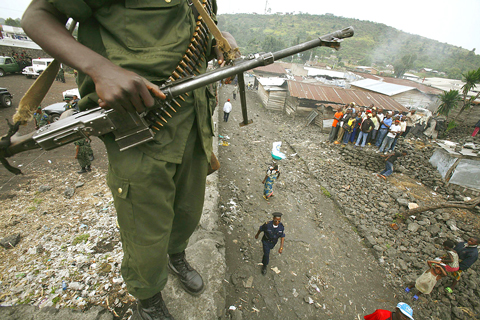A government offensive in the Democratic Republic of Congo (DRC) that rights groups say has caused many civilian deaths should not be suspended and UN peacekeepers should continue supporting it, a senior UN official said on Friday.
The disarmament of some 1,000 of an estimated 6,000 rebels in eastern DRC has come at a cost of nearly 900,000 people displaced, 1,000 dead civilians and 7,000 rapes of women and girls, humanitarian and rights groups say.
But Alan Doss, head of the UN peacekeeping mission in the DRC, rejected suggestions that the world body withdraw support for government forces fighting Rwandan Hutu rebels, who have been central to 15 years of violence in Central Africa.

PHOTO: AFP
“Reducing the pressure now would give the FDLR [Hutu rebels] time to regroup and rearm,” Doss told a meeting of the UN Security Council on the DRC.
“It would also send an ambiguous message to some elements of the [Congolese army] who have in the past cooperated with the FDLR,” he said. “Rwanda might also see this as a step backwards from the rapprochement that has opened up an entirely new perspective” for mineral-rich eastern DRC.
The rebels, known as the Democratic Forces for the Liberation of Rwanda, include some members of extremist Hutu groups from Rwanda’s 1994 genocide and are seen as a root cause of violence in the DRC, which has simmered despite elections in 2006 meant to end years of war.
Launched in January, the offensive started in North Kivu Province with the backing of Rwanda, the DRC’s former enemy, and has been extended into South Kivu with the support of the UN Security Council.
But rights groups say the offensive has sparked massive displacement as civilians are caught between attacks by rebels and widespread abuses by government troops now including hastily integrated former rebels and militia fighters.
Doss acknowledged the criticism of the Congolese army and said UN forces “will withdraw support from battalions that show a blatant disregard for international humanitarian law.”
He later told reporters the UN force has thus far not stopped supporting any Congolese battalions.
Philip Alston, the UN’s special rapporteur on extrajudicial executions, said in Kinshasa last week that Congolese soldiers had killed at least 50 civilian refugees and raped some 40 women and girls during an incident in April.
Alston said the massacre happened when the soldiers, mainly former Congolese Tutsi rebels integrated into the army as part of a January peace deal, attacked the village of Shalio during an offensive into South Kivu Province.
Doss said there should be an investigation of the incident but said it had not occurred during a UN-supported operation and involved no UN personnel.

NO EXCUSES: Marcos said his administration was acting on voters’ demands, but an academic said the move was emotionally motivated after a poor midterm showing Philippine President Ferdinand Marcos Jr yesterday sought the resignation of all his Cabinet secretaries, in a move seen as an attempt to reset the political agenda and assert his authority over the second half of his single six-year term. The order came after the president’s allies failed to win a majority of Senate seats contested in the 12 polls on Monday last week, leaving Marcos facing a divided political and legislative landscape that could thwart his attempts to have an ally succeed him in 2028. “He’s talking to the people, trying to salvage whatever political capital he has left. I think it’s

Polish presidential candidates offered different visions of Poland and its relations with Ukraine in a televised debate ahead of next week’s run-off, which remains on a knife-edge. During a head-to-head debate lasting two hours, centrist Warsaw Mayor Rafal Trzaskowski, from Polish Prime Minister Donald Tusk’s governing pro-European coalition, faced the Eurosceptic historian Karol Nawrocki, backed by the right-wing populist Law and Justice party (PiS). The two candidates, who qualified for the second round after coming in the top two places in the first vote on Sunday last week, clashed over Poland’s relations with Ukraine, EU policy and the track records of their

UNSCHEDULED VISIT: ‘It’s a very bulky new neighbor, but it will soon go away,’ said Johan Helberg of the 135m container ship that run aground near his house A man in Norway awoke early on Thursday to discover a huge container ship had run aground a stone’s throw from his fjord-side house — and he had slept through the commotion. For an as-yet unknown reason, the 135m NCL Salten sailed up onto shore just meters from Johan Helberg’s house in a fjord near Trondheim in central Norway. Helberg only discovered the unexpected visitor when a panicked neighbor who had rung his doorbell repeatedly to no avail gave up and called him on the phone. “The doorbell rang at a time of day when I don’t like to open,” Helberg told television

‘A THREAT’: Guyanese President Irfan Ali called on Venezuela to follow international court rulings over the region, whose border Guyana says was ratified back in 1899 Misael Zapara said he would vote in Venezuela’s first elections yesterday for the territory of Essequibo, despite living more than 100km away from the oil-rich Guyana-administered region. Both countries lay claim to Essequibo, which makes up two-thirds of Guyana’s territory and is home to 125,000 of its 800,000 citizens. Guyana has administered the region for decades. The centuries-old dispute has intensified since ExxonMobil discovered massive offshore oil deposits a decade ago, giving Guyana the largest crude oil reserves per capita in the world. Venezuela would elect a governor, eight National Assembly deputies and regional councilors in a newly created constituency for the 160,000